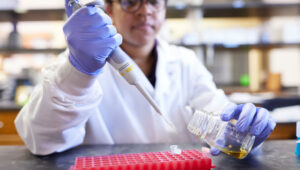Texas A&M receives $6 million to create center of excellence in cancer
Cancer Prevention and Research Institute of Texas grant will support cancer prevention and care
Texas A&M University Health Science Center, Texas A&M Health, is the recipient of a five-year, $6 million Texas Regional Excellence in Cancer award from the Cancer Prevention and Research Institute of Texas, CPRIT.

The award will establish the Texas A&M University Center of Excellence in Cancer. The new center will take advantage of Texas A&M’s available resources to address unmet needs in cancer prevention and treatment regionally and across the nation.
Center of Excellence focus
The Texas A&M University Center of Excellence in Cancer will focus on mentoring early career investigators interested in cancer research and recruiting outstanding researchers. It will also focus on creating a highly interactive environment that promotes collaborations and incentivizes development of impactful cancer research programs of national and international relevance.
The program will draw from a talented pool of investigators from different academic units to study how biology and genes are modified by environmental and lifestyle factors to influence cancer risk, as well as how to effectively use this knowledge to increase precision in cancer prevention and health care delivery.
Texas A&M Health’s Kenneth Ramos, M.D., Ph.D., Alkek Chair in Medical Genetics, executive director and assistant vice chancellor for health services, will serve as director of the center. Robert Chapkin, Ph.D., University Distinguished Professor and Allen Endowed Chair in the College of Agriculture and Life Sciences Department of Nutrition and Department of Biochemistry and Biophysics, will serve as deputy director.
A key component of the center will be a Single Cell Data Analysis Coreoverseen by James Cai, Ph.D., associate professor, School of Veterinary Medicine and Biomedical Sciences Department of Veterinary Integrative Biosciences, created to facilitate single cell multi-omics research. Another key component will be a Cancer Prevention Clinicogenomics Registry Core, overseen by Rick Silva, Ph.D., an instructional assistant professor in Texas A&M Health’s Center for Genomic and Precision Medicine, to provide context for the implementation of translational strategies in support of the Texas A&M TREC projects.
Additional components include an Administrative Core, a recruitment committee and mentoring teams. Evaluation efforts will be overseen by Marcia Ory, Ph.D., Regents and Distinguished Professor at the Texas A&M School of Public Health.
Texas Regional Excellence in Cancer initiative
The Texas A&M TREC initiative will build a critical mass of cancer researchers at Texas A&M, facilitate collaborations within and outside the institution and support innovative research that improves prevention and the development of cures for these devastating diseases.
Project leaders include:
- Sanjukta Chakraborty, Ph.D., assistant professor, Department of Medical Physiology; primary mentor: Stephen Safe, Ph.D., University Distinguished Professor, veterinary medicine.
- Irtisha Singh, Ph.D., assistant professor, Department of Cell Biology and Genetics; primary mentor: Nancy Huang, Ph.D., associate professor, Institute of Biosciences and Technology.
- Shogo Sato, Ph.D., assistant professor, Department of Biology; primary mentor: Weston Porter, Ph.D., professor, veterinary medicine.
- Shreya Raghavan, Ph.D., assistant professor, Department of Biomedical Engineering; primary mentor: Tanmay Lele, Ph.D., Unocal Professor, Biomedical Engineering and Chemical Engineering.
This story written by Jennifer Cain first appeared in the Texas A&M Health Vital Record.


